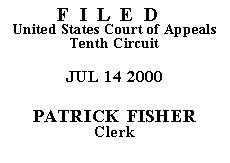

| TOM MILLS, TERESA MILLS-MOHLER and
FRED MILLS,
v.
JOHN LEE, Acting (IDO); R. E.
HOLT, Warden Defendants-Appellees. |
No. 00-1055
(D.C. No. 99-Z-2147) (Colorado) |
Tom Mills, Teresa Mills-Mohler, and Fred Mills, appearing pro se, appeal from the district court's dismissal of their civil rights complaint. We affirm.
Tom Mills is a federal prisoner who was formerly housed at the United States Penitentiary in Florence, Colorado. Teresa Mills-Mohler, Tom Mills' sister, filed this pro se complaint on behalf of and as legal guardian of Fred Mills, their disabled father. This complaint arises out of his treatment in January, 1999, when he visited Tom at the Florence facility. As alleged in the complaint, Fred Mills was denied access to the prison in his own wheelchair and prison officials failed to provide a prison wheelchair for approximately two hours, during which time Mr. Mills "pull[ed] himself along the storm rail" in an effort to reach the visiting area. Rec., doc. 5, Amended Complaint at 3. Tom, Teresa, and Fred request money damages, a writ of mandamus and other injunctive relief for the alleged violation of Fred Mills' constitutional rights and the prison officials' violations of the Americans with Disabilities Act, the Rehabilitation Act, federal racketeering laws and additional state statutes, all of which allegedly resulted in Fred Mills' personal injuries and Fred, Tom, and Teresa's emotional distress.
The district court first dismissed Tom and Teresa as plaintiffs for a lack of standing as they failed to allege any violation of their own constitutional rights. Turning to Fred Mills' claims, the district court rejected his request for mandamus and injunctive relief since Tom was no longer housed at the Florence facility and the prison had modified its policies to permit disabled visitors access to prison wheelchairs. The court next held that while the conduct as alleged in the complaint was, at best, a tort against Mr. Mills, it did not rise to a constitutional violation. The court noted that Mr. Mills had filed a tort claim against the government under the Federal Tort Claims Act which was still pending. The court then recognized that money damages under the Rehabilitation Act were barred by the government's sovereign immunity, and finally dismissed the racketeering and ADA claims for failure to state a claim.
We first note that Tom Mills was the only person signing the notice of appeal in this case, and thus we must address whether Fred and Teresa are appellants before us. See Fed. R. App. P. 3(c)(2) (pro se notice of appeal is only filed on behalf of party signing notice). Teresa Mills-Mohler signed and filed an entry of appearance with this court within sixty days of the district court's dismissal. Because that document was timely filed under Rule 4, and gave sufficient notice as required by Rule 3, this pro se document is effective as a notice of appeal for her. See Smith v. Barry, 502 U.S. 244, 248-49 (1992). Finally, since Teresa alleges she is her father's legal guardian, she may appeal on his behalf. See Hull v. United States, 53 F.3d 1125, 1126 (10th Cir. 1995). We therefore have appellate jurisdiction over all the plaintiffs listed in the complaint.
The only argument presented on appeal by the Mills is their contention that the district court erred in dismissing their complaint without first holding a hearing or requiring the defendants to answer. The party filing a complaint has the burden to set forth a "short and plain statement of the claim showing that the pleader is entitled to relief." Fed. R. Civ. P. 8(a). This requires a pro se plaintiff to allege sufficient facts in the complaint which, if true, would entitle the plaintiff to the requested relief. See Riddle v. Mondragon, 83 F.3d 1197, 1202 (10th Cir. 1996); Hall v. Bellmon, 935 F.2d 1106, 1110 (10th Cir. 1991). The district court here dismissed the complaint on its face for failing to allege facts showing any of the parties were entitled to relief under any of the legal theories they presented. See Fed. R. Civ. P. 12(b)(6). The district court did not err by failing to require an answer to the complaint or in not according the Mills an evidentiary hearing. Under Rule 12(b)(6), a court may sua sponte dismiss the complaint "when it is 'patently obvious' that the plaintiff could not prevail on the facts alleged, and allowing him an opportunity to [further] amend his complaint would be futile." Hall, 935 F.2d at 1109-10 (quoting McKinney v. Oklahoma, 925 F.2d 363, 365 (10th Cir. 1991)).
To the extent that the Mills appeal the merits of the district court's dismissal, we agree with the court's conclusion substantially for the reasons set forth in its thorough order. See Rec., doc. 6.
The district court's dismissal is therefore AFFIRMED.
ENTERED FOR THE COURT
Stephanie K. Seymour
Chief Judge
*.This order and judgment is not binding precedent, except under the doctrines of law of the case, res judicata, or collateral estoppel. The court generally disfavors the citation of orders and judgments; nevertheless, an order and judgment may be cited under the terms and conditions of 10th Cir. R. 36.3.